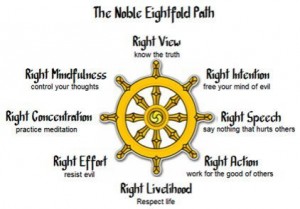The following is an excerpt from a teaching by Jetsunma Ahkon Lhamo called “Reclaiming Our Merit”
Lord Buddha built the path sequentially. First what did he teach? That all sentient beings are suffering, that suffering is all pervasive,. that the cause of that suffering is desire and greed. None of which we, by the way, have bothered to get rid of. But he also taught that there was an end to suffering, and he taught that as the eightfold path. Unfortunately, we’ve gotten so ahead of ourselves, thinking that we are Dzogchen practitioners that we haven’t bothered to have right mind, right concentration, right meditation, right work, … (I have a list somewhere. I’ve forgotten them all.) But all of the eightfold path, all of those different qualities, they have to be looked at one at a time. Right speech: That means cut out the gossip; that means you cut out the bullshit and the bad words you have toward each other. Right contemplation:. Ok, what is wrong contemplation? Wrong contemplation is watching phenomena dance around you and just buying in, dancing with it. Right contemplation would be taking the Buddha’s teachings one by one and studying them carefully. Have any of you practiced the eightfold path? No. No. Then the Buddha came along, and he took the eightfold path and he sort of condensed it into the Mahayana view, which is wisdom and compassion.
The thing is, that when we have wisdom and compassion, we think, ‘Oh, that’s much easier.’ So we leave behind the eightfold path and we go right to the wisdom and compassion; and really we do ourselves a disservice by faking our way through it. Wisdom is something that arrives through practice, through service to fulfilling the ideas that Lord Buddha presented before. In other words, wisdom and compassion are not considered separate or different or above the eightfold path. You still have to accomplish the eightfold path, you see. And when you have fulfilled that, then you have the capacity to give rise to wisdom and compassion. And then you find out that the reason why the eightfold path was taught first, and Mahayana second, , is that it’s almost impossible to keep your commitment as a bodhisattva and to practice the way of the bodhisattvas for even one hour.
And so we have to rely on all that we’ve learned before this to build this house of Dharma. We have to make sure it’s all standing correctly, and we’re all here in line, and the foundation is good. Then you can start to build a house. That’s your wisdom and your compassion. And you have to ask yourself, has it come yet? We’re waiting for compassion to come likeHappy Birthday, you know, some sort of thing that is coming from a wave from the sky. Suddenly you’ll be good. But in order to really give rise to compassion like that, you have to have your foundation; and then as you begin to give rise to the bodhicitta, you have to base it on what you learned before.
What did you learn before? All sentient beings are suffering. That in samsara, suffering is so pervasive that our perception is askew. We don’t know up and down. We’re running so fast to get away from discomfort and pain; we really don’t have ourselves in order. This is what the Buddha taught. And so you look at the situation of sentient beings. If you did that right contemplation and you did it right, you really spent some time on it. And you open your eyes. You don’t close them and say, ‘I hate this stuff. I can’t look.’ You open your eyes and see it, and be willing to shoulder the burden of noticing that what Lord Buddha taught was right: That there is nothing but suffering, really, and we’re causing it ourselves through our being asleep and our lack of understanding.
Copyright © Jetsunma Ahkon Norbu Lhamo All rights reserved
